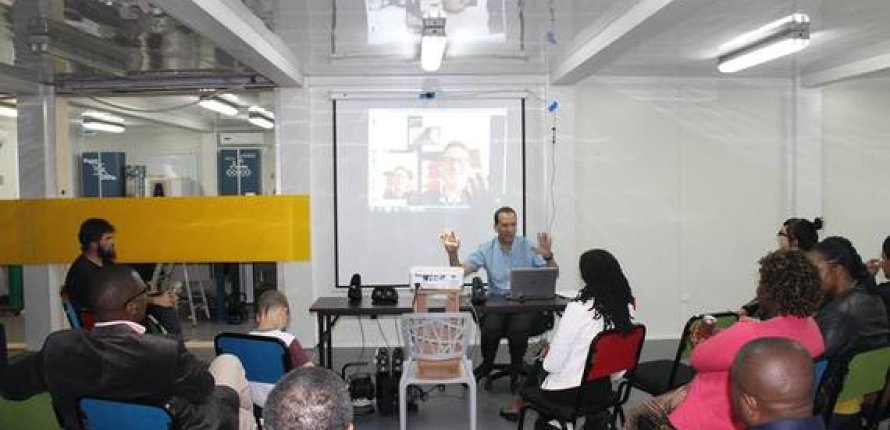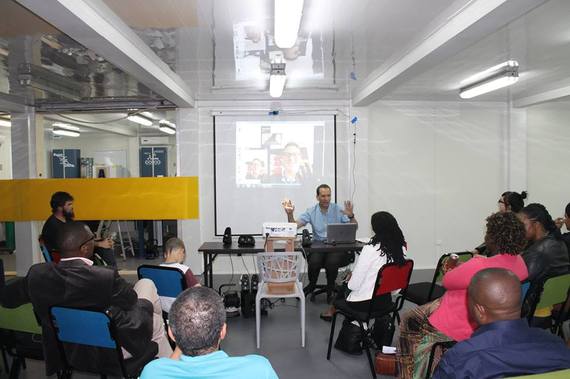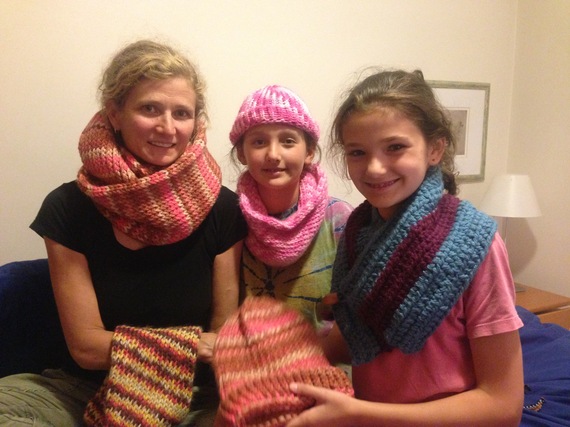Is There a Business Here? Pushing Social Entrepreneurs Out of Their Comfort Zone in Namibia

Michael Goldberg, Assistant Professor, Design & Innovation, Case Western Reserve University
May 2015 Fulbright Specialist Grantee to Namibia
Reposted with permission via www.huffingtonpost.com
As a Fulbright Specialist, I have had some amazing opportunities to connect my work as a scholar in the United States with real-world applications in entrepreneurship. In early May 2015, my Fulbright Specialist grant took me to Polytechnic of Namibia, working with students and faculty on entrepreneurship. In the university’s Innovation Village, I discovered FABlab Namibia. Any Namibian with a new idea can come to this bright green, yellow, and red cluster of container buildings to build a prototype, find a business mentor, or access a global network of businesspeople. FABlab opened just over a year ago and is quickly becoming a center for entrepreneurship, engineering, and design. My home university, Case Western Reserve, has something similar called think [box], where I have also experienced the importance of giving entrepreneurs a place to create prototypes of their innovative ideas.
 Professor Brad Bernthal Joining the Discussion at FABlab Namibia via Skype from Chile
Professor Brad Bernthal Joining the Discussion at FABlab Namibia via Skype from Chile
One week at FABlab, I facilitated a vibrant discussion with around thirty participants from Namibia's three accelerators (FABlab Namibia, the Namibia Business Innovation Institute, and Global Business Labs Namibia), plus several Namibian entrepreneurs, investors, government officials, university students, and mentors. Together we watched my massive open online course (MOOC) video lecture on seed accelerators (part of my Case Western Reserve University online course, “Beyond Silicon Valley: Growing Entrepreneurship in Transitioning Economies”). Professor Brad Bernthal, an Associate Professor of Law at the University of Colorado-Boulder, joined the discussion by Skype. His current research examines the organizational structure of accelerators, with a particular focus on mentor interactions with portfolio companies. We exchanged ideas about strategies for growing entrepreneurship in Namibia that have worked in other parts of the world and examined how governments and donors can support the formation and growth of seed accelerators when private sector capital alone is not available or sufficient to do so. In the United States, Ohio's Third Frontier Program provides grants to a number of seed accelerators and passes money on to their portfolio companies in exchange for a small percentage of equity ownership.
Kirstin Wiedow, Director and Co-Founder of FABlab Namibia, reflected on the impact of value of the event: "It was a really insightful session; having stakeholders from the various sectors all sharing their experiences together with the guidance of Brad and Michael made for a truly valuable experience - as even the word 'seed accelerator' was not known by all attendees from the onset. I hope this is the start of some regular sessions and continued engagement between the seed accelerators, entrepreneurs, private equity, academia and all involved parties."
I additionally had the privilege of leading six days of programming for a social entrepreneurship bootcamp that took place in Namibia, Zambia and Zimbabwe. The bootcamp focused on how social entrepreneurs can thrive (and survive) without relying on traditional donor funding. A crucial first step to success is for an entrepreneur to develop a differentiated product or service that the market is willing to pay for. We again viewed lectures developed for MOOC which included my own on “Beyond Silicon Valley,” to give them perspective on how communities around the world are supporting the growth of entrepreneurial ecosystems. For homework, I asked the students to make calls to real potential customers, ask if they would be willing to pay for their products and services, and report back the next day.
After the session in Zambia, Chembo Litana got on the phone with a fair trade shop in the United States and asked the manager how she could sell her organization's colorful, hand-knitted scarves. "I learned that social business is still business,” said Chembo, Programmes Manager for the International Trust for the Education of Zambian Orphans (ITEZO). "Competing and making a profit is just as fundamental as the social side. My product should be good enough to be bought even without the social story. The social story should be icing on the cake or a convincing factor."
 My wife Stacy and daughters Kate and Anna enjoying their ITEZO knitted scarves
My wife Stacy and daughters Kate and Anna enjoying their ITEZO knitted scarves
I played an active role in Chembo's customer discovery process and found three satisfied customers for ITEZO's scarves...my wife and two daughters loved the products I bought for them. Hopefully Chembo and the other social entrepreneurs who attended the bootcamp will find success on their journey to turn their social concepts into thriving businesses. While the pipeline of entrepreneurs is still very much emerging in Southern Africa, I was pleased to see that there are organizations in place to provide critical early stage support.
As an Assistant Professor of Design & Innovation, I often lecture on business principles and entrepreneurship. As a Fulbright Specialist, I had an opportunity to see the concepts I teach in my classes implemented in real life with some amazing young businesspeople. I look forward to seeing their businesses grow and take pride in the small part I was able to play in their success.
Read the full length articles:
Climbing Sand Dunes and Talking Seed Accelerators in Namibia and
Is There a Business Here? Pushing Social Entrepreneurs Out of Their Comfort Zone in Southern Africa
